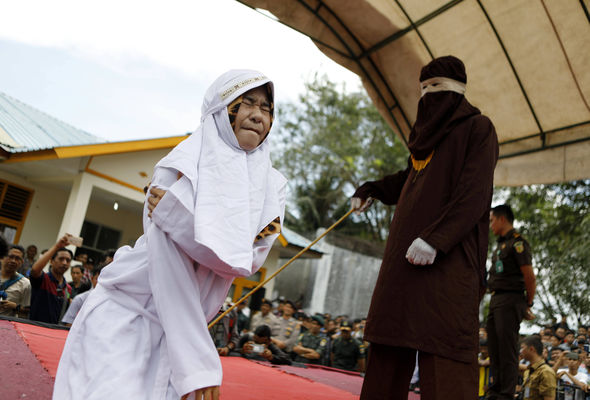Sharia Law Prevails Again

Agenzia Fides, the information service of the Pontifical Mission Societies, reported on January 18, that the body of a Catholic priest, Fr. John Gbakaan, was discovered in Nigeria on Saturday, a day after he was kidnapped by armed men.
Fr. Gbakaan “was allegedly executed with a machete in such a brutal manner that identification was hardly possible.”

The priest of the diocese of Minna, in Nigeria’s Middle Belt, was attacked by unidentified men on the evening of January 15. He was traveling with his younger brother along Lambata-Lapai Road in Niger State following a visit to their mother in Makurdi, Benue State.
Also this month, a mob of Muslim extremists in Uganda slaughtered a former imam, 41-year-old Yusuf Kintu, a week after he converted to Christianity.
In the summer of 2019, I had the opportunity to visit Christians persecuted by Muslim fundamentalists — specifically Boko Haram — in the Catholic Diocese of Maiduguri in northeast Nigeria. As I traveled through the outskirts of the city, I spent some time with a woman whose husband, Yohanna, had been kidnapped by Boko Haram just two days prior. She was very much comforted by her fellow parishioners at St. Augustine’s church, who were praying and hoping against hope that Yohanna would be released. Tragically, just hours after our meeting, he was found dead.
Like Fr. Gbakan’s and Kintu’s killings, Yohanna’s murder is just one of many such horrific stories in the African continent, as well as in Middle and Eastern Asian countries, that normally go unreported by the mainstream media. Western powers hold that they can end such aforementioned Islamic terrorism by force. At the same time, its politicians and many Church leaders fail to get at the root of the ongoing persecution against Christians and other religious minorities, even against innocent Muslims: sharia law.
What is Sharia?
Sharia literally means the “way” or “path.” Historically articulated, it is a shorthand term for an amorphous body of legal rulings, judgments and opinions, assembled over the course of many centuries after the Muslim Prophet Muhammad’s death. It is based on the Quran and a copious number of hadiths (the sayings and acts of Muhammad) developed by the fuqaha (jurists) whose opinions enjoy an almost absolute authority over the faithful.
As a rule of law, it precludes the development of human reason as it is viewed as an expression of Allah’s inscrutable will. It is this same supremacy that renders sacred and permanent the concept of inequality between the Islamic community and the non-Islamic community, between the Muslim and the non-Muslim, and between man and woman.
Aspects of Sharia Law:
Jihad: Jihad is holy war against the infidels — (or kafir) is someone who denies Islam — of the world. Under sharia law all Muslims are obliged to kill the infidel; many think that killing an infidel guarantees going straight to paradise.
Apostasy: All apostates are to be killed. An apostate is any person who renounces Islam and changes his religion. Christians are not allowed to convert Muslims to Christianity. Conversion is perceived as blasphemy and carries the death penalty: “Whoever changes his [Islamic] religion, then kill him.” (Sahih al-Bukhari, Book 84, hadith 57) Distributing Christian literature can result in a five-year prison sentence under sharia law.
Criticism of Islam: The death penalty applies to Muslims who criticize Muhammad, the Quran or sharia Law. Severe penalties also apply to Christians who speak out against Islam.
Freedom of Worship: Although Islam pays lip service to “People of the Book” (Christians and Jews), and the Quran says to respect and honor all people irrespective of their religion, the reality is that some Islamic countries are persecuting Christians, targeting their places of worship, and killing and imprisoning believers. Persecution is intense in Saudi Arabia, Afghanistan, Iran, Iraq, Somalia, Yemen, Maldives, and other countries with a strong Islamic influence.

Female victims of rape: Sharia Law protects rapists. A woman making an accusation of rape has to provide four male witnesses. If she is unable to do so, she will be charged with zina, for which the prescribed punishment is flogging or stoning. Thousands of women, including minors, are imprisoned as a result of unsuccessful charges of rape. Some are even stoned to death. On October 27, 2008, Aisha Ibrahim, a 13-year-old girl in Kisayu, Somalia, was stoned to death for adultery; later, her aunt told the BBC that Aisha had been raped by three armed men. Rapists are seldom brought to trial, let alone punished.
Failure to Acknowldege
One of the failures of the West — one cannot put faith into the Russia or Communist China — is to recognize that Islam, from its inception, is intertwined with political ambitions. Its doctrine cannot be separated from its globalist socio-political sphere. This is why Islam is not a mere private observance of the individual Muslim but, as taught throughout its 1400-year-old history, a public manifestation of Allah’s will:
Allah said, “It is not for any prophet to take prisoners until he has made slaughter on earth,” i.e., “slaughtered his enemies until he drives them from the land. You [Muhammad], desire the lure of this world, its goods and the ransom captives. But Allah desires the next world,” i.e., killing them to manifest the religion which Allah wishes to manifest on this earth. —Sira Rasul Allah (the first written biography of Muhammad) by Ibn Ishaq, 326–327
As expressed by the Organization of Islamic Cooperation’s Cairo Declaration on Human Rights in Islam (1990), sharia law has continues to be reaffirmed as a global objective:
“Allah…gave humanity a universal and well-balanced civilization, in which harmony [under the Islamic Sharia] is established between hereunder and the hereafter, knowledge is combined with faith, and to fulfill the expectations from this community to guide all humanity, which is confused because of different and conflicting beliefs and ideologies and to provide solutions for all chronic problems of this materialistic civilization.”
It is important to note that in countries where sharia law is prevalent, such as Iran, Iraq, (north) Nigeria, Pakistan, Saudi Arabia, etc. , the constitution becomes inferior to the Islamist laws of the land. In fact, every article in the constitution becomes contingent on compliance with sharia. The rights that are constitutionally guaranteed are nullified if it means siding on the side of justice would opposed sharia law..
It is not enough to hope that one day Christians will be able to practice their faith in sharia-based countries without fear of persecution or death. Action must be taken by the international community to ensure that the such Islamic nations stand by their own constitution to provide non-Muslims equal rights and protections — this includes a full halt of selling arms to heinous Islamist regimes like the United States has done with Saudi Arabia for decades or like Israel has done with Azerbaijan, thereby facilitating their jihad against the Armenian Christians.
__________________________________________________

Mario Alexis Portella is a priest of the Cathedral of Santa Maria del Fiore and Chancellor of the Archdiocese of Florence, Italy. He has a doctorate in canon law and civil law from the Pontifical Lateran University in Rome; he also holds a M. A. in Medieval History from Fordham University, as well as a B.A. in Government & Politics from St. John’s University. He is also author of Islam: Religion of Peace? – The Violation of Natural Rights and Western Cover-Up.

Book available on Amazon, Barnes & Noble or WestBow Press.





Recent Comments